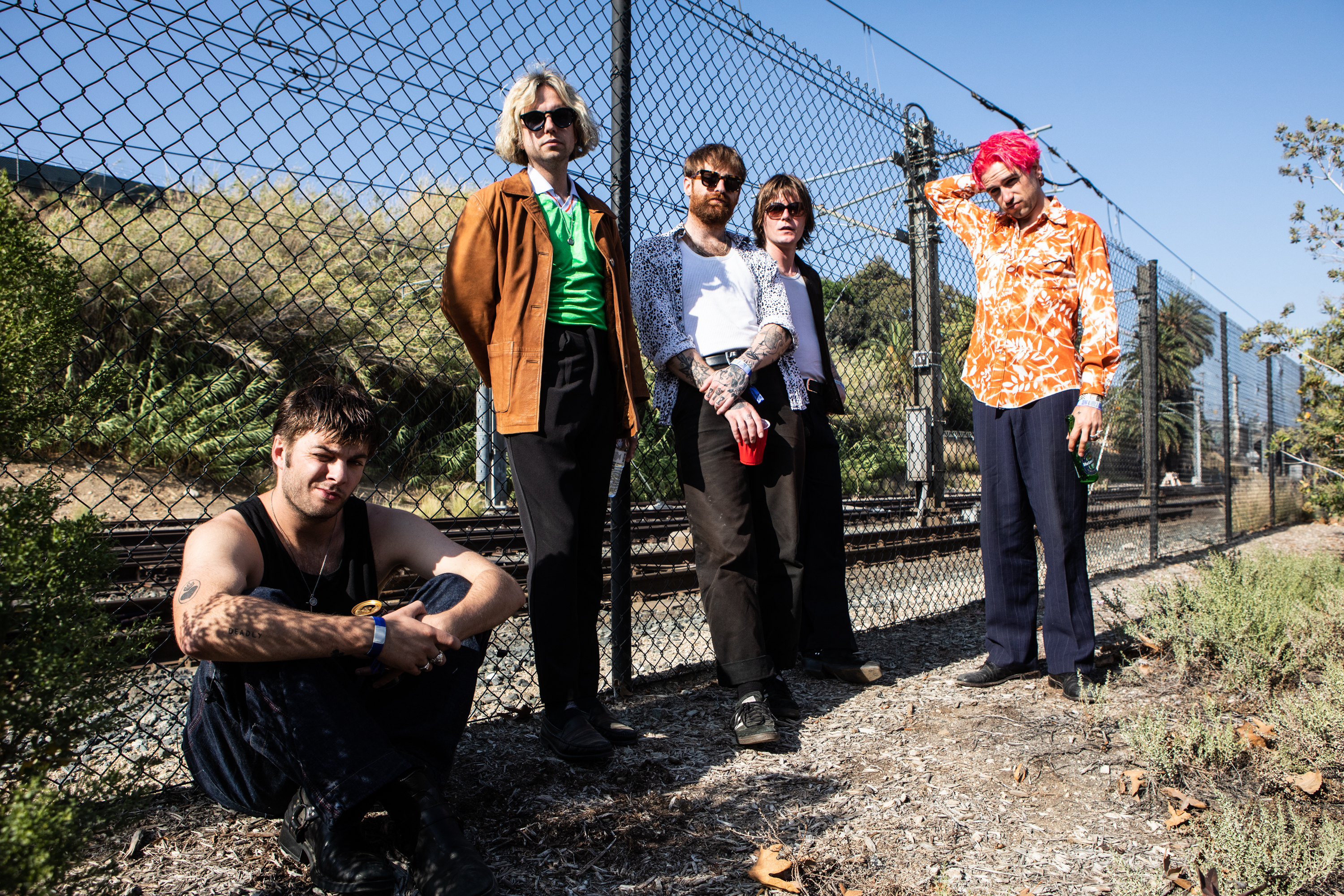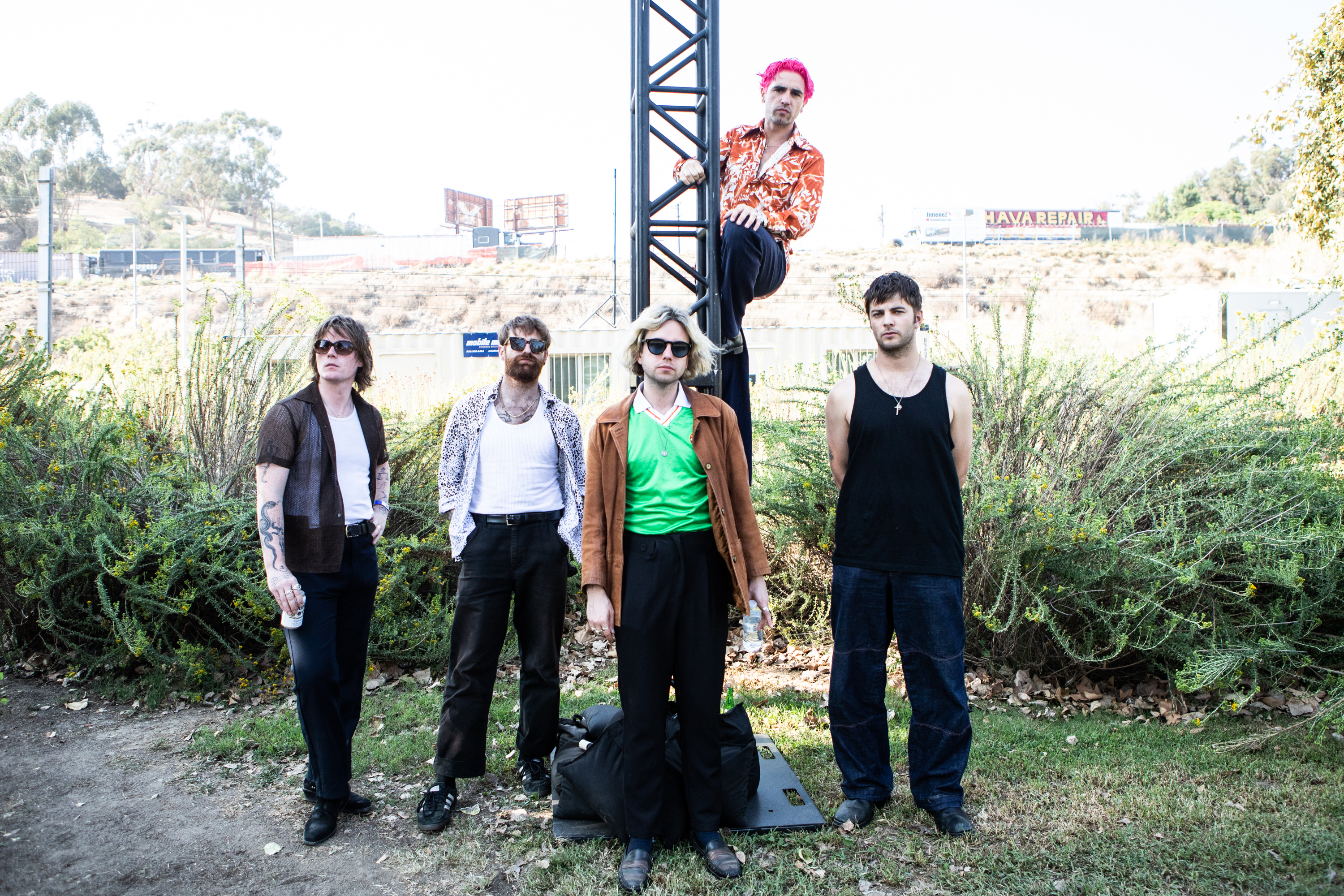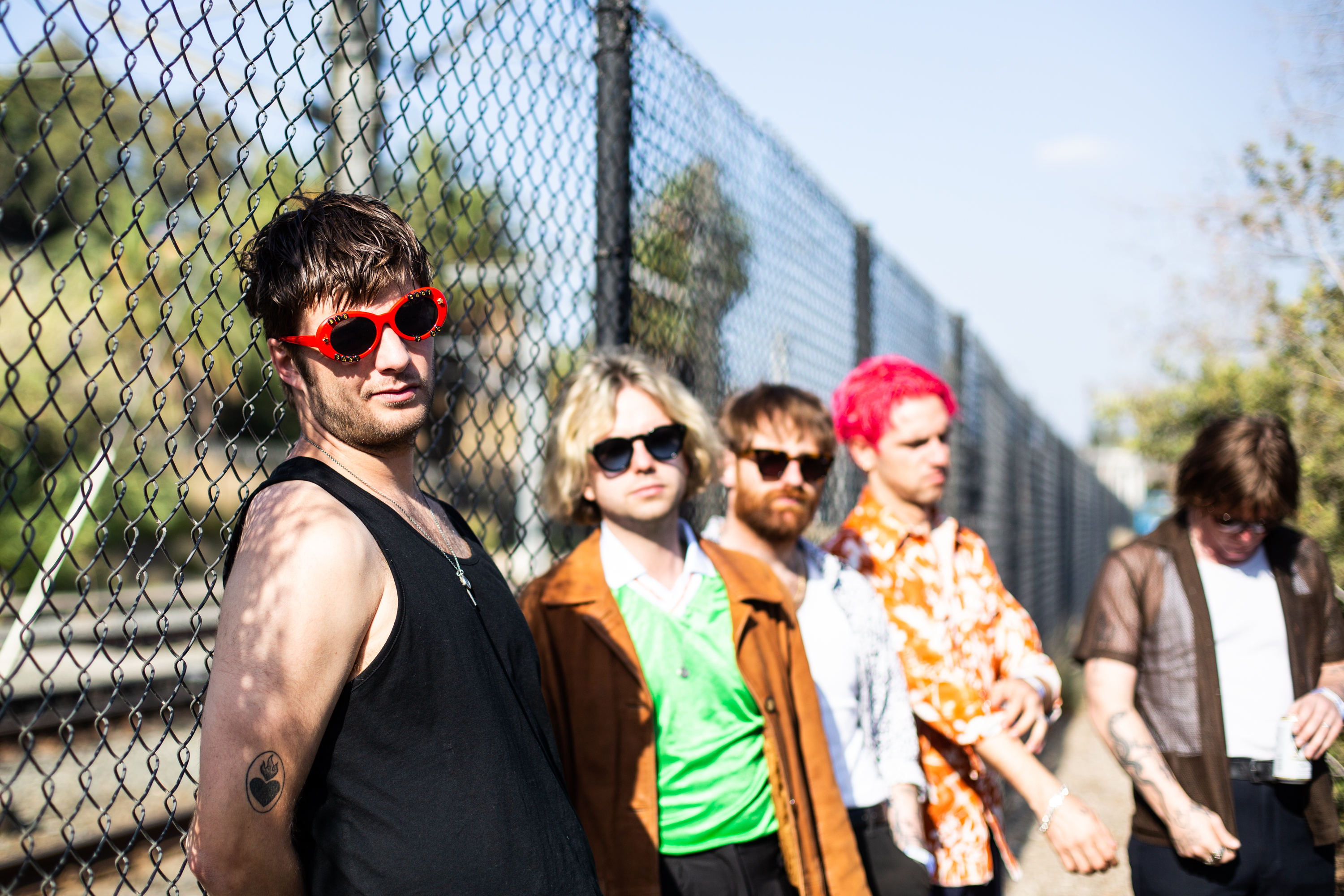
A lot of bands might call themselves the “best band in the world,” but Fontaines D.C. is one of the few who can actually claim the title. Hailing from Dublin, the five-piece band bagged a trophy for Best Band In The World at the NME awards this year. But that’s not the only win Fontaines D.C. have had lately.
Their recently released post-punk album Skinty Fia went No. 1 in the UK and Ireland, and they celebrated by performing to a crowd of over 50,000 at Primavera Sound. On top of that, the group’s 2020 sophomore album A Hero’s Death was Grammy-nominated for Best Rock album and earned a nod for Best International Group at the BRITs. But despite their impressive superlative and Fontaines D.C.’s coveted nominations, vocalist Grian Chatten remains humble.
For Chatten, getting the chance to write songs for a living is far more important than any award or accolade he could ever receive. “There’s a fair few jobs that I could be doing that’d I’d be happy with, 9-5’s that I can think of,” he says over the phone just before Fontaines D.C. took the stage at the inaugural Primavera Sound LA. “I’d love to work in a bookshop. I think I’d be basically as happy as I am now as long as I could go home and write for myself.”
Chatten’s in it for the music, and Fontaines D.C.’s critical recognition is just a cherry on top. Well, most of the time it is. Their newfound fame also had a few drawbacks that came with international attention, like when the band found themselves in a highly publicized chart battle with Taylor Swift. A Hero’s Death was racing to No. 1 in the UK at the same time as Taylor Swift’s Folklore was climbing the charts, unintentionally pitting the two artists against each other. “We got death threats and all that kind of stuff,” Chatten recalls, chuckling at the memory of getting on the wrong side of Swift’s, shall we say, emboldened fanbase. “That whole world is just beyond me. I don’t really even try and understand it. One thing I would say is that they’re dedicated fans.”
But now, Fontaines D.C. find themselves, like Swift, embraced by a global fanbase. After being unable to tour much behind their 2020 Grammy-nominated release, the band has just embarked on a months-long global tour. They’ll make stops across the US, Europe, Australia, Japan, and play three sold-out shows in their Dublin hometown. Toasting the band’s massive success and lengthy tour, Chatten sat down with Uproxx to talk Ian Curtis comparisons, future plans, and how performing on stage is as close as he can get to having a “positive” panic attack.

Your last album, A Hero’s Death was nominated for Grammy and for a BRIT award when it was released. What was your reaction to hearing that you were Grammy nominated? Was that something that you ever thought would happen when you first started the band?
I don’t think so. It’s difficult for me to tell — we kind of shrouded ourselves in this blind optimism from the get-go and I don’t know to what extent that was real. I think the whole point of it was to not know how much it was real. We told ourselves at the very beginning that we were great, but we did have extreme self-doubt, like anyone does. My reaction was — I couldn’t believe it. I thought there was a mistake, you know what I mean? And it felt like this weird infiltration. I think a lot of people say that, and it’s probably a little bit self-aggrandizing to say that. It felt like we must have gotten in a back door somewhere.
And can you tell me about how you felt being nominated in the same category as artists like The Strokes?
The Strokes were huge for us as a band whe growing up. They’re kind of a good soundtrack to our friendship as well. I’m glad they won it, to be honest. I’m glad they won it because I think they deserve it, they have deserved one for years and I think it’s mad that they didn’t have one already. And I think that their last album was really, really admirable. There’s a tenacity to it. Genuinely, I really prefer them winning it to us winning it, honestly.
Speaking about your success as well, you were recently named the Best Band in the World by NME. I was wondering if you recall a certain moment — I know you said that you kind of started the band with blind optimism — but do you recall a certain moment where you really felt like you made it as a band?
I used to worry about my inability to feel or dwell on achievements. I used to think that it was a kind of shortcoming on my behalf and it was a signal of my non-presence in the moment. But now, I actually just think that it’s just kind of in my makeup to look ahead. The most important thing for me, the thing that gives me existential value, is songwriting; Songwriting and lyric writing or poetry, finding expression in words and in music. And I mean that sincerely. It takes up so much of my mental space and my heart that I don’t have time or space to look backwards on awards and titles like Best Band In The World and all that. I feel it kind of just induces fear. I don’t really want to feel ever like I’m on top of anything. I’m much more comfortable punching up.
I’m curious to hear too about how your family and your hometown have reacted to your band’s success. I’m sure that they’re pretty proud, right?
Dublin’s a bit scary for me now. I get recognized quite a bit. It can be a bit difficult to go to — a lot of my favorite spots, a lot of my favorite pubs are basically no-go areas for me now because I’ll just end up having a conversation that I’m not invested in for the whole night with someone who is being really nice but is not my friend or family. But Dublin fans are really funny because they stay slagging, they give you a hard time, which is really Irish and really funny. But if it happens a hundred times in one day, it actually can get to you.
So talking a little bit about your tour and your live shows, do you and your band have any pre-show rituals that you do together before you go out on stage?
I think the ritual happens to me, whether I like it or not. It’s in the sort of two hours before a show, I start this slow wave of anxiety and adrenaline. Energy basically comes over me and it’s kind of like the moments before vomiting, it’s like I’m almost retching with anxiety and energy. I think I’m prone to overstimulation. If too many people are moving in a room or people keep walking in and out of a room, I have to run. I get kind of overstimulated. And that’s basically the feeling that I have for an hour before the show. It’s really uncomfortable and I can’t stop moving around and touching things and picking things up and putting them down and jumping up and down.
And I’m not focused. I’ll be talking to people, but it’ll almost be like I’m blacked out. I don’t know what I’m saying. I’m not listening to them. It’s really weird. It’s just excitement, it’s nervous energy and stuff like that. Me and [Conor] Curley have to do a pretty good shot of tequila right before we go on. That’s kind of our thing.
That anxious, nervous energy, do you release it on stage or does it stay with you when you’re on stage?
I release it on stage. Like the gig is the vomit, you know what I mean? I always have a huge sense of relief, euphoria, and endorphins rushing after a show. But during the gig, my body is tense for the whole thing. My toes curl up for the whole gig and I come off stage and I realize because my feet are f*cking killing me. I think it’s almost like a positive version of an anxiety attack. It’s like, I’ve got way too much energy in my body on stage. I really enjoy gigs. Touring is really difficult, and I have a lot of problems with the rest of the mechanics of touring and stuff. But gigs are blessing for me.
You talked a little bit about how being back in Dublin can be kind of weird because you get recognized all the time, but I want to hear about what your hometown shows are like, because I know that the end of this tour has three back-to-back sold-out shows in Dublin. I can imagine that they get pretty crazy, right?
The last couple we’ve done felt like there’s been this pent-up energy. Dublin is in a really kind of strange state in terms of government and cost of living and what it’s like to be a young person there. I think there’s a lot of dissatisfaction amongst young people in Dublin at the moment, for good reason. They know that, we know it, and they know that we know it. And when we play a show in Dublin, there’s this collective expression. I feel like we’re all singing on behalf of each other for a common purpose. And that’s really, really powerful. It’s probably the most communal I’ve ever felt at a gig was our last Dublin show.

Now that you’ve played some shows in the US, is there anything that has surprised you about your American audience?
I’m really surprised about how much they connect with our songs which are based on stories of life in Dublin. To me, there’s a specificity to our lyrics that I didn’t think would translate as well as it has. And that’s been amazing to see. We played a show in Salt Lake City and I really had no idea what to expect from an audience there, with my preconceptions about what people who lived in Salt Lake City were going to be like. But it kicked off. That was amazing.
This is something that came up a lot when I was reading some of your interviews and people just writing about you. Something that I see a lot is people calling you, “This generation’s Ian Curtis,” what do you have to say to that?
Yeah, I’ve been hearing that for f*cking years. I don’t know. I feel like we’ve made so much music that isn’t similar to them at this stage. I don’t look like him, do I? People say that I do, but I don’t agree.
You don’t think he’s your celebrity lookalike?
Not really. Maybe there’s a physical movements similarity and I don’t know, but I think he was a genius. So, I’m pretty cool with that. I’m going to keep doing my own thing though.

Now that you’ve been named The Best Band In The World by NME and you’ve been nominated for Grammy, what’s your next goal for your band?
Honestly, it’s just really… I feel boring sometimes because I feel I keep answering in the same way, but it’s really just about songwriting. It’s so simple. I love songwriting and I’m really just looking forward to doing more songwriting. And that’s such an uninteresting thing to say. One thing I’m really looking forward to is collaboration. I feel strong enough in [Fontaines DC’s] identity as an artist now that I’m really open to collaboration and I’d love to write with someone else’s voice. I think I’m really limited as a vocalist. I think I’d really love to write songs for female voice.
Nice, like a songwriter for a bigger pop star or something?
Yeah, maybe. I’ve got a lot of friends who are in bands who aren’t necessarily bigger or pop stars. There’s a band called Sorry from London. Actually, do you know what? I actually want to go on the record and say I think [Asha Lorenz] is genius. And I’ve never said that word in an interview before about someone alive. I think she is a genius. I’ve heard the record that they’re putting out soon. I’ve heard the whole thing and it’s just jaw-dropping. I’d love to write with her. I think her voice is so cool as well. If she was willing, I’d love to direct that voice for one show.
Catch Fontaines D.C. on tour this fall. Skinty Fia is out now via Partisan. Get it here.
